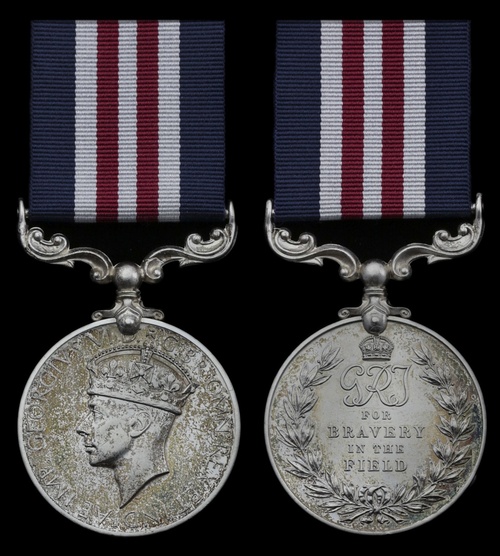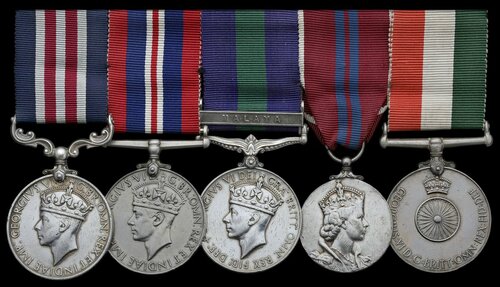An important Malaya operations O.B.E., Korea War Silver Star group of ten awarded to Colonel J. B. Gillies, Argyll and Sutherland Highlanders: in the 1st Battalion’s courageous assault on “Hill 282” in Korea on 23 September 1950, he fought alongside Major K. Muir, and was one of three men to submit statements in support of the latter being awarded a posthumous V.C. - it was Gillies who recorded the Major’s last words before he was carried mortally wounded from the summit: “No Gooks are going to drive the Argylls off this position” The Most Excellent Order of the British Empire, O.B.E. (Military) Officer’s 2nd type breast badge; 1939-45 Star; Defence and War Medals 1939-45; General Service 1918-62, 2 clasps, Palestine 1945-48, Malaya, M.I.D. oak leaf (Major J. B. Gillies, A. & S.H.); Korea 1950-53 (Major J. B. Gillies, A. & S.H.); Federation of Malaya Active Service Medal; United States of America, Silver Star, officially numbered 110339’ and the reverse inscribed ‘James B. Gillies’; Negri Sembilan Distinguished Conduct Medal, mounted court-style as worn, generally good very fine (10) £3000-3500 Footnote O.B.E. London Gazette 14 August 1959: ‘In recognition of distinguished service in Malaya for the period ending 31 December 1958.’ Mention in despatches London Gazette 13 October 1956: ‘In recognition of distinguished services in Malaya during the period 4 January to 30 June 1956.’ U.S.A. Silver Star London Gazette 8 June 1951. The original Eighth United States Army (Korea) General Order No. 204, dated 20 December 1950, states: ‘Major Gillies, while serving in the 1st Battalion, The Argyll and Sutherland Highlanders, 27th British Commonwealth Brigade, distinguished himself by gallantry in action against an armed enemy near Waegan, Korea on 23 September 1950. Major Gillies commanded one of the companies which successfully captured Hill 282. A friendly air strike, using napalm, was misdirected against his company and forced it to withdraw from the crest of the hill. Major Gillies, by his courage and determination in the face of heavy enemy fire and the demoralizing effect of the air strike, was instrumental in steadying the survivors and in leading them back to their positions on the hill. Major Gillies, with a few men, held these positions in the face of intense enemy artillery, mortar and small arms fire and repeated attacks until all wounded were evacuated to safety and the unit could withdraw under fire in good order to more tenable positions. He repeatedly exposed himself to intense enemy fire to encourage and direct his men. Major Gillies was the last to withdraw from the position, and then only after he had personally determined that all the wounded had been evacuated. The gallantry displayed by Major Gillies reflects great credit upon himself and the military service of the British Commonwealth and the United Nations force.’ One of just 14 Silver Stars awarded to members of the British and Commonwealth Forces for Korea. James Blair Gillies was born in Glasgow in December 1913 and was educated at the King’s School, Chester. Enlisting in the Royal Army Service Corps in May 1940, he was advanced to Sergeant in August 1941 and was selected for officer training in February 1942. Subsequently commissioned as a 2nd Lieutenant in the Royal Scots, he served in India, South Africa and latterly at Scottish Command. In December 1946, Gillies transferred to the Argyll and Sutherland Highlanders and was posted to the 1st Battalion in Palestine in 1948 as Adjutant. Shortly afterwards he assumed command of ‘C’ Company in the rank of Major in Hong Kong, from whence he was embarked with his regiment for Korea. His own account of the celebrated action on Hill 282, sworn under oath in support of the recommendation for a posthumous V.C. to Major K. Muir, states: ‘On 23 September 1950, two companies of the 1st Battalion, The Argyll and Sutherland Highlanders, ‘B’ and ‘C’ Companies [the latter under Gillies’ command], attacked an enemy held hill
An important Malaya operations O.B.E., Korea War Silver Star group of ten awarded to Colonel J. B. Gillies, Argyll and Sutherland Highlanders: in the 1st Battalion’s courageous assault on “Hill 282” in Korea on 23 September 1950, he fought alongside Major K. Muir, and was one of three men to submit statements in support of the latter being awarded a posthumous V.C. - it was Gillies who recorded the Major’s last words before he was carried mortally wounded from the summit: “No Gooks are going to drive the Argylls off this position” The Most Excellent Order of the British Empire, O.B.E. (Military) Officer’s 2nd type breast badge; 1939-45 Star; Defence and War Medals 1939-45; General Service 1918-62, 2 clasps, Palestine 1945-48, Malaya, M.I.D. oak leaf (Major J. B. Gillies, A. & S.H.); Korea 1950-53 (Major J. B. Gillies, A. & S.H.); Federation of Malaya Active Service Medal; United States of America, Silver Star, officially numbered 110339’ and the reverse inscribed ‘James B. Gillies’; Negri Sembilan Distinguished Conduct Medal, mounted court-style as worn, generally good very fine (10) £3000-3500 Footnote O.B.E. London Gazette 14 August 1959: ‘In recognition of distinguished service in Malaya for the period ending 31 December 1958.’ Mention in despatches London Gazette 13 October 1956: ‘In recognition of distinguished services in Malaya during the period 4 January to 30 June 1956.’ U.S.A. Silver Star London Gazette 8 June 1951. The original Eighth United States Army (Korea) General Order No. 204, dated 20 December 1950, states: ‘Major Gillies, while serving in the 1st Battalion, The Argyll and Sutherland Highlanders, 27th British Commonwealth Brigade, distinguished himself by gallantry in action against an armed enemy near Waegan, Korea on 23 September 1950. Major Gillies commanded one of the companies which successfully captured Hill 282. A friendly air strike, using napalm, was misdirected against his company and forced it to withdraw from the crest of the hill. Major Gillies, by his courage and determination in the face of heavy enemy fire and the demoralizing effect of the air strike, was instrumental in steadying the survivors and in leading them back to their positions on the hill. Major Gillies, with a few men, held these positions in the face of intense enemy artillery, mortar and small arms fire and repeated attacks until all wounded were evacuated to safety and the unit could withdraw under fire in good order to more tenable positions. He repeatedly exposed himself to intense enemy fire to encourage and direct his men. Major Gillies was the last to withdraw from the position, and then only after he had personally determined that all the wounded had been evacuated. The gallantry displayed by Major Gillies reflects great credit upon himself and the military service of the British Commonwealth and the United Nations force.’ One of just 14 Silver Stars awarded to members of the British and Commonwealth Forces for Korea. James Blair Gillies was born in Glasgow in December 1913 and was educated at the King’s School, Chester. Enlisting in the Royal Army Service Corps in May 1940, he was advanced to Sergeant in August 1941 and was selected for officer training in February 1942. Subsequently commissioned as a 2nd Lieutenant in the Royal Scots, he served in India, South Africa and latterly at Scottish Command. In December 1946, Gillies transferred to the Argyll and Sutherland Highlanders and was posted to the 1st Battalion in Palestine in 1948 as Adjutant. Shortly afterwards he assumed command of ‘C’ Company in the rank of Major in Hong Kong, from whence he was embarked with his regiment for Korea. His own account of the celebrated action on Hill 282, sworn under oath in support of the recommendation for a posthumous V.C. to Major K. Muir, states: ‘On 23 September 1950, two companies of the 1st Battalion, The Argyll and Sutherland Highlanders, ‘B’ and ‘C’ Companies [the latter under Gillies’ command], attacked an enemy held hill
/113321/Internet%20Image%201.jpg)
/48998/Internet%20Image%201.jpg)
/100470/Internet%20Image%201.jpg)


/125931/Internet%20Image%201.jpg)
/118456/Internet%20Image%201.jpg)




/123867/Internet%20Image%201.jpg)



Testen Sie LotSearch und seine Premium-Features 7 Tage - ohne Kosten!
Lassen Sie sich automatisch über neue Objekte in kommenden Auktionen benachrichtigen.
Suchauftrag anlegen